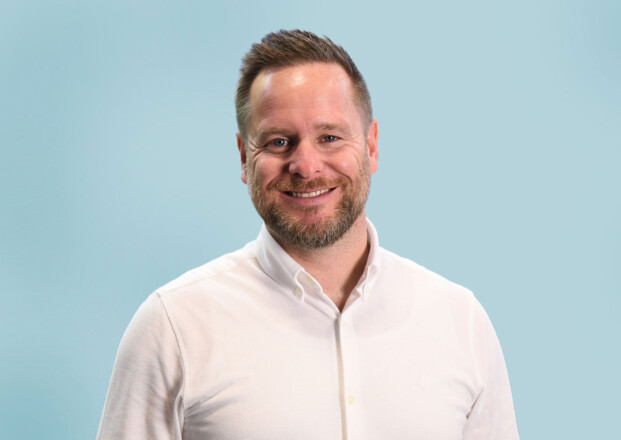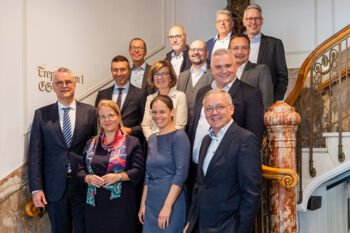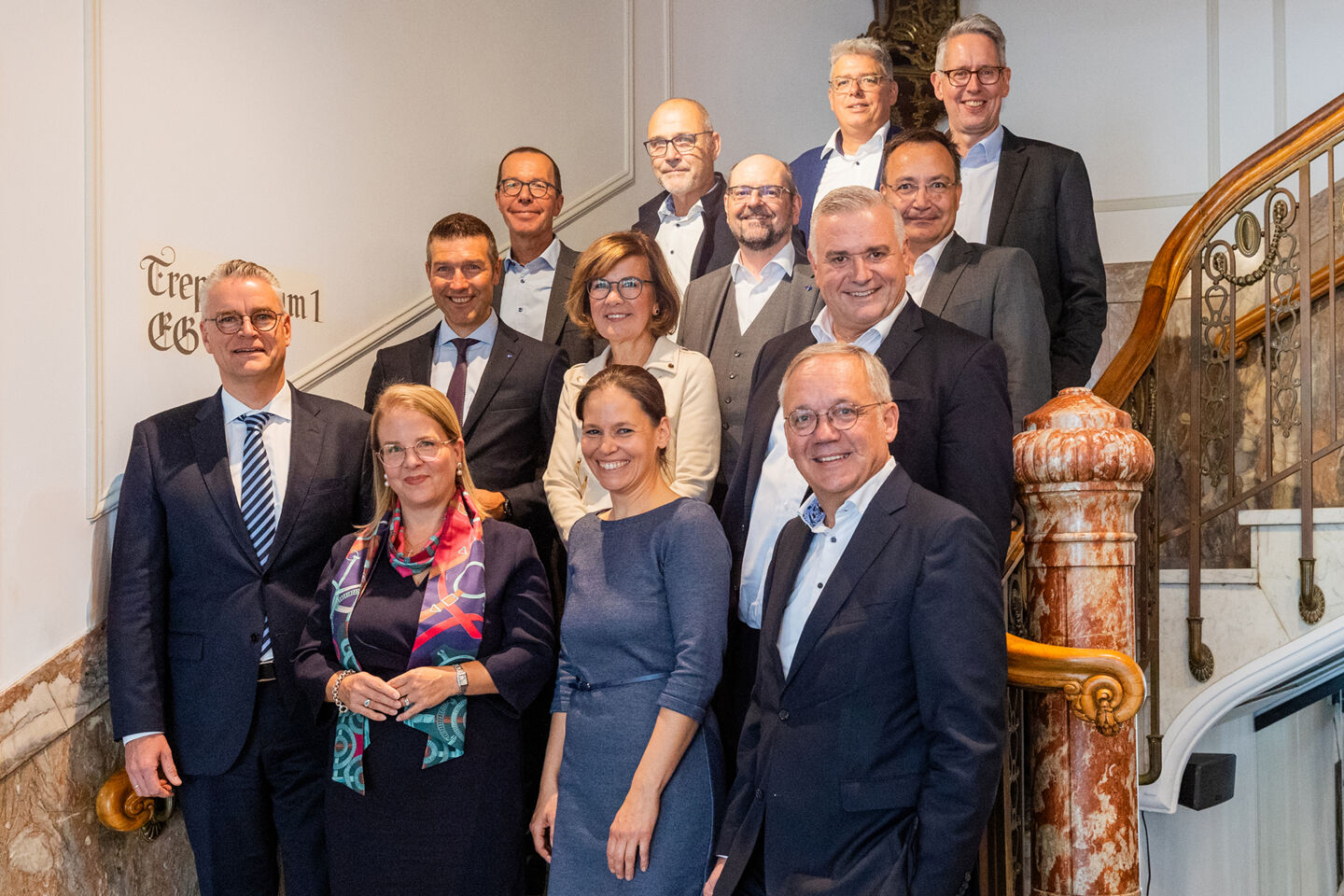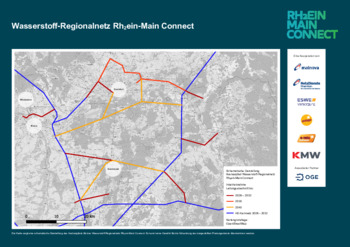
20 Mar 2024
Wiesbaden
ENTEGA AG, Mainova AG, ESWE Versorgungs AG, Kraftwerke Mainz-Wiesbaden AG, Open Grid Europe GmbH, e-netz Südhessen AG, NRM Netzdienste Rhein-Main GmbH
Press release
Energy supplier alliance gives go-ahead for regional hydrogen distribution network in Frankfurt/Rhine-Main
METROPOLITAN REGION TO RECEIVE HYDROGEN REGIONAL NETWORK RH2EIN-MAIN CONNECT
Hydrogen is seen as the energy source of the future. At the same time, the development of a local hydrogen economy is still in its infancy. The Hessian energy industry plays a decisive role here - from hydrogen production, transportation and distribution to its use in various applications and sectors, industry, transport, heating and power generation.
The Frankfurt/Rhine-Main metropolitan region will now have its own regional distribution network for hydrogen: the first sections of "Rh2 ein-Main Connect" are due to go into operation from 2028. The regional suppliers ENTEGA AG, Mainova AG, ESWE Versorgungs AG and Kraftwerke Mainz-Wiesbaden AG (KMW) as well as the transmission system operator Open Grid Europe GmbH (OGE) and the distribution system operators e-netz Südhessen AG and NRM Netzdienste Rhein-Main GmbH have now concluded a corresponding cooperation agreement to design the new "Rh2 ein-Main Connect" regional hydrogen network, to supply the metropolitan region with climate-neutral hydrogen through several connections to the H2‑ core network from 2028 to 2032.
"With a view to achieving climate neutrality in Hesse by 2045 at the latest, we need to decide today how we want to supply industry and SMEs with climate-neutral heat and green electricity in the future. In coordination with the plans to build the hydrogen core network, we are taking this step today to jointly build our own climate-neutral distribution network in Frankfurt/Rhine-Main as part of a consortium," explained Dr. Marie-Luise Wolff, CEO of ENTEGA AG, on the occasion of the signing of the cooperation agreement in Wiesbaden.
Dr. Jörg Bergmann, CEO of OGE, adds: "OGE has initiated the national infrastructure project "H2ercules" with partners, which will supply consumers in the south and west of Germany with green hydrogen from domestic production and via various import routes. H2ercules is part of the hydrogen core network that will open up important consumption centers, such as the Rhine-Main region in particular. For regional penetration, we need the distribution network operators to work together to make decarbonization using hydrogen possible for a broad group of consumers."
Peter Arnold, CEO of Mainova AG , adds: "The use of hydrogen is crucial for a successful heating transition, particularly in the heating market. As a climate-friendly energy source, it will also play a key role in achieving climate protection targets. However, this requires a decisive start to hydrogen technology and the corresponding expansion of the infrastructure. In the Frankfurt/Rhine-Main metropolitan region, we expect a hydrogen ramp-up before the end of this decade. To achieve this, Mainova and its consortium partners will have to invest massively in the further distribution of hydrogen. We are already seeing great demand for climate-neutral energy from our customers."
Dr. Oliver Malerius, CEO of KMW AG, explains: "In order to meet the increasing demand for hydrogen in both Hesse and Rhineland-Palatinate by the time climate neutrality is achieved in 2045, the new regional hydrogen network should be dimensioned with foresight. In close cooperation with the partners involved in the consortium, consumption locations with high hydrogen demand, e.g. for the generation of CO2-neutral electricity and (process) heat, will be identified and developed in terms of pipeline technology. These developed sites will also enable the efficient use of hydrogen in industry, commerce and private households for heat generation."
Jörg Höhler, Chief Technical Officer of ESWE Versorgungs AG, concludes: "What we have agreed today is a genuine hydrogen network for the region with a total length of around 300 km through the Rhine-Main region. The first sections of the initial network must be newly constructed by 2032, after which we will increasingly rededicate existing natural gas pipelines. We are in agreement with all partners involved in the consortium that hydrogen should be fed in both from long-distance pipelines and decentrally. If possible, we will also give industrial partners in the Rhine-Main region the opportunity to feed hydrogen produced by electrolysis from their plants into the new regional network. Furthermore, the expected investment costs for a regional hydrogen infrastructure cannot be borne by the distribution grid operators alone. Funding and financing programs from the public and private sectors are required. This is where the state of Hesse can make a decisive contribution to launching the first public, climate-neutral hydrogen distribution network in Hesse together with the municipal regional suppliers."
The first sections of the regional hydrogen network "Rh2ein-Main Connect" are to be built by 2028 and will ensure the supply of hydrogen to early anchor customers in the region from the start of operation. The new pipelines are to be integrated into the protective strip of the existing natural gas network wherever possible. Local distribution of the hydrogen will then begin from 2032. From this point onwards, the focus will be less on new construction and more on converting the existing infrastructure from natural gas to full hydrogen use in order to achieve a gradual transition across the region.
According to a demand estimate, the Frankfurt/Rhine-Main metropolitan region is forecast to have an annual hydrogen demand of around 5 terawatt hours (TWh) in 2030, which will increase to around 24 TWh per year by 2045. The partners involved in the consortium expect the necessary investments for the planning and construction of the regional network "Rh2ein-Main Connect" to amount to around 610 million euros by 2040.
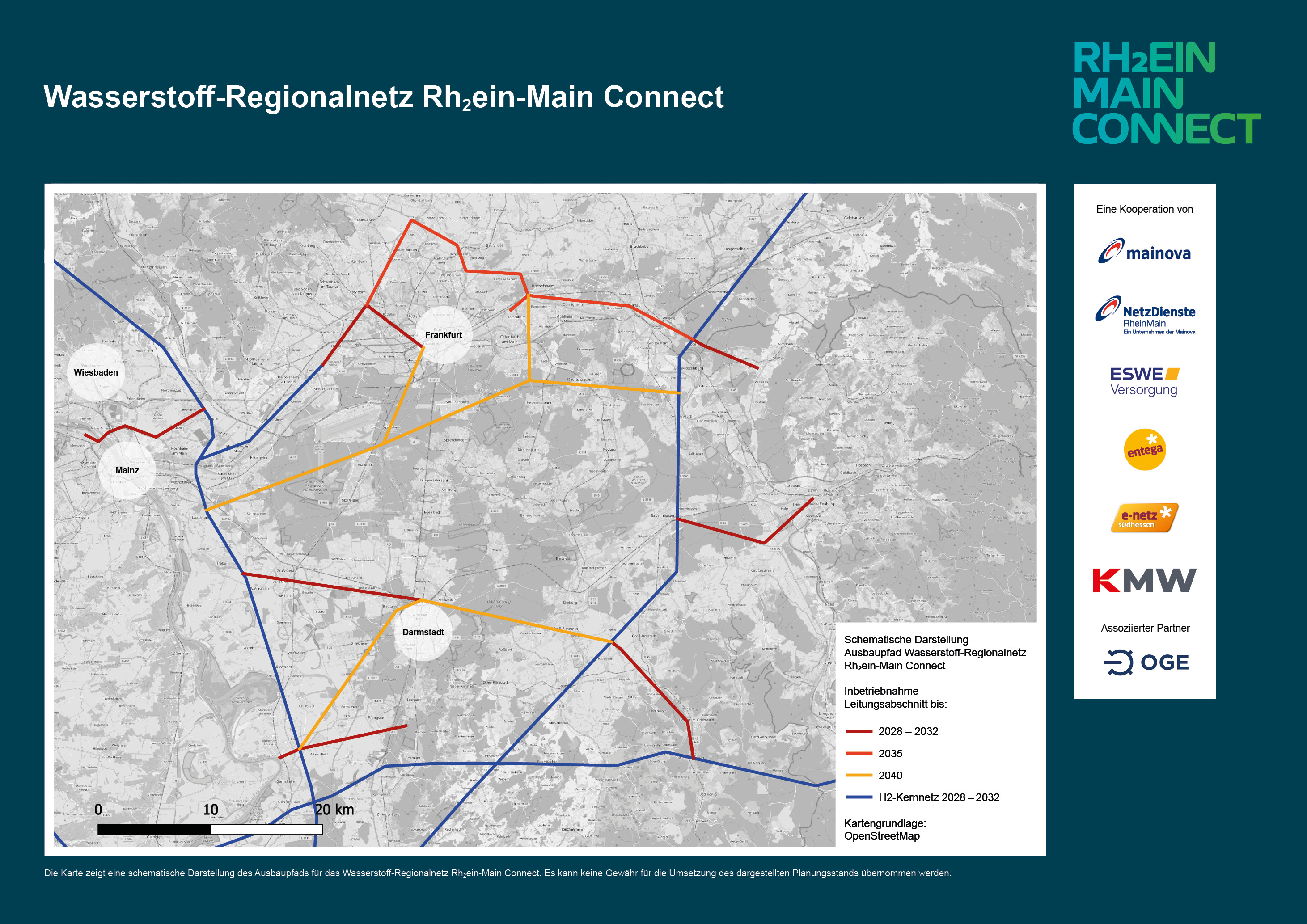
Hydrogen projects in the Frankfurt/Rhine-Main metropolitan region
ESWE Versorgungs AG and Mainova AG took their first steps towards hydrogen back in 2014 and, together with eleven other project partners from the municipal Thüga Group, commissioned an electricity-to-gas demonstration plant. The plant converted electricity into hydrogen and then fed this into the gas distribution network. "Looking back on the project, we are convinced that this technology has the greatest long-term potential for storing surplus quantities of renewable energy. For the first time, the existing gas grids have begun to be used not only as a traditional means of transportation in the context of the energy transition, but, connected to the electricity grid, they also serve as a storage and transport medium for renewable energies converted into hydrogen and ensure that they can be used in a variety of ways," adds Jörg Höhler.
ENTEGA AG in Darmstadt is also planning to produce its own green hydrogen at the site of the waste-to-energy plant with the "DELTA" research project. The primary aim here is to provide hydrogen for mobility, particularly for local public transport. "Water is energized in an electrolyser so that hydrogen and oxygen separate from each other. The approx. 310 tons of hydrogen produced annually by the planned plant is enough to run around 40 buses, saving around 4,000 tons of CO2 per year in terms of consumption. In the future, the use of the waste heat generated during the electrolysis process for heating purposes will also be investigated. This versatile hydrogen technology, which urgently needs to be further tested in Germany, is becoming increasingly important for the implementation of climate protection targets. ENTEGA is already filling this gap with the DELTA real laboratory," explains Dr. Marie-Luise Wolff.
Matthias Bürk, Site Manager of the Merck Group at its headquarters in Darmstadt, adds: "As a science and technology company, we see ourselves as a future consumer of hydrogen in Hesse. Merck wants to be climate-neutral worldwide by 2040. At the same time, security of supply is a priority. The planned construction and operation of a hydrogen distribution network from 2028 encourages us to focus on green hydrogen at our Darmstadt site in line with our energy strategy. We need an energy mix from renewable energies. Thanks to our own generation from geothermal energy and photovoltaics, we can contribute a portion ourselves. ENTEGA is already an important strategic partner for us, as our joint expansion with large-scale PV systems at the Merck sites in Darmstadt and Gernsheim shows."
Hydrogen also plays a key role in the ongoing conversion of Mainova AG's West cogeneration plant in Frankfurt. Peter Arnold comments on this as follows: "Our new model power plant will be groundbreaking for the decarbonization of the city of Frankfurt am Main. With the plant technology already designed for the use of hydrogen, we will achieve a high level of greenhouse gas savings from 2026. Our climate protection heavyweight will supply the people of Frankfurt with CO2-neutral heat and electricity. We will all benefit from this. It is important that politicians finally create reliable framework conditions and further develop the Combined Heat and Power Act."
KMW AG is also planning to build a hydrogen-capable gas-fired power plant on the Ingelheimer Aue. It is intended to supplement renewable energies and supply electricity when the wind is not blowing and the sun is not shining in order to ensure security of supply in a CO2-free energy future in the region. The power plant of the future will be built in such a way that the natural gas initially used can be replaced as quickly and completely as possible with hydrogen. Commissioning is planned for 2028. "As a modern producer, we want to provide 100% climate-neutral energy and ensure long-term future security and maximum sustainability. That is why we are planning to invest in hydrogen-capable energy generation in Mainz," concludes Dr. Oliver Malerius.
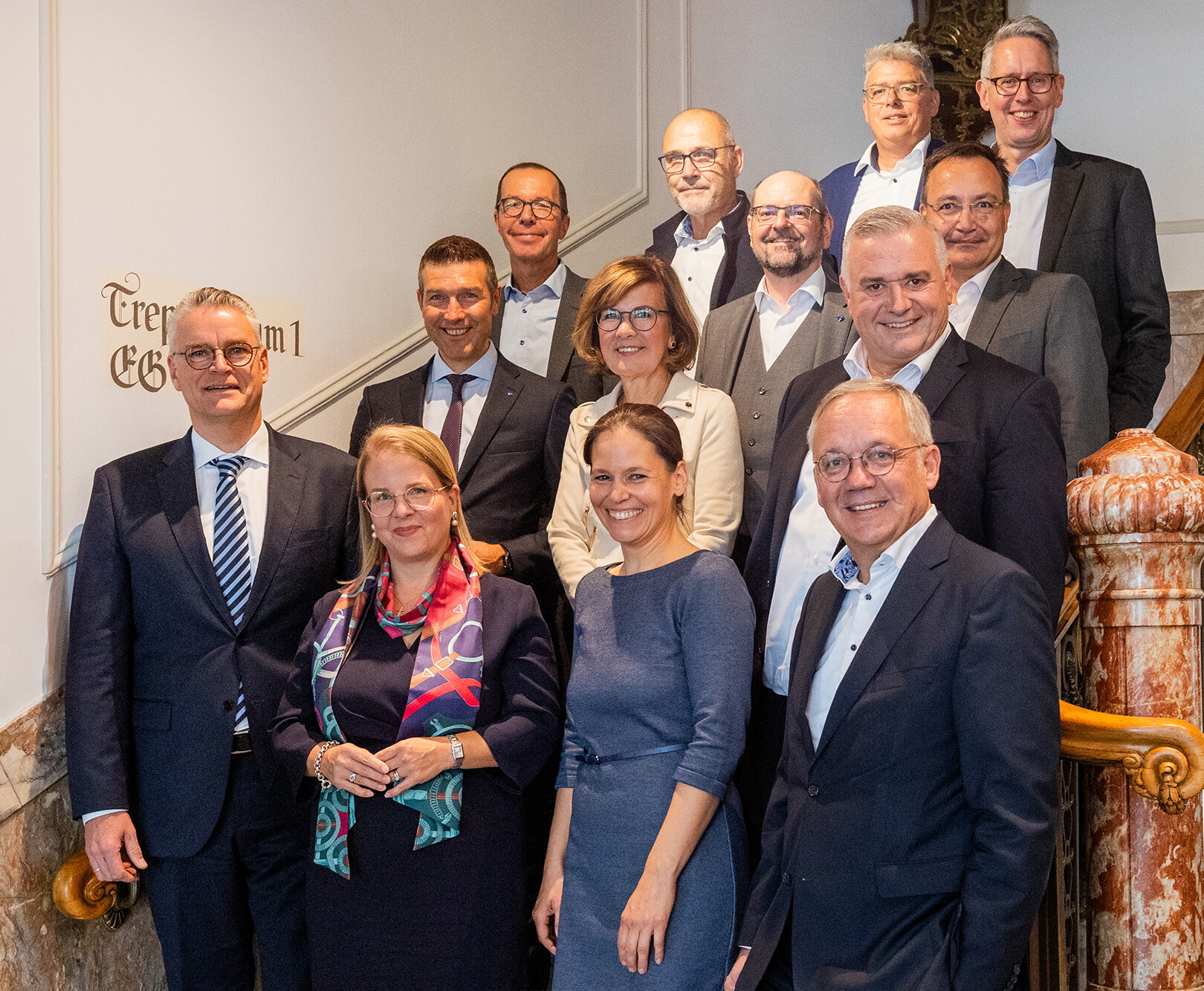
Sabine Augustin, Head of Corporate Development, Policy & Communications OGE (front row, second from left) together with the other project managers after signing the contract for the Rh2ein-Main Connect regional hydrogen network in Wiesbaden
